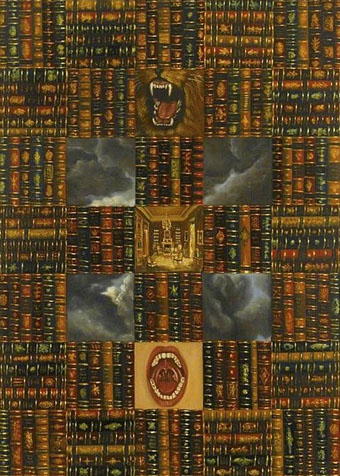Black Hole (1987) by Suzanne Treister.
• “Most people who are considered heroes are always to be found messing about in someone else’s affairs, and I don’t think that’s very heroic.” Robert Altman talking in 1974 to Jan Dawson about The Long Goodbye.
• “Tea is calming, but alerting at the same time.” Natasha Gilbert on the science of tea’s mood-altering magic.
• Alien spaceship, Hammer horror? Philip Hoare on the pulsating visions of Harry Clarke.
“…world cinema, particularly European cinema…hasn’t shied away from sex and, in fact, has often found ways of using sex to tell a story. Movies like The Duke of Burgundy or Sauvage or BPM gracefully integrate eroticism into the narrative—even when the sex itself is far from graceful. Even the American films that have focused on sex tend to do it with a leer and luridness, regarding sex with a certain narrative fetishism, as opposed to matter-of-factly.”
Rich Juzwiak talking to Catherine Shoard about the current state of sex in the cinema
• Chernobyl again: photographs by David McMillan from inside the exclusion zone.
• Lasting Marks: the 16 men put on trial for sadomasochism in Thatcher’s Britain.
• Before Tarkovsky: Michael Brooke on the Russian TV adaptation of Solaris.
• Mix of the week: XLR8R Podcast 588 by Rouge Mécanique.
• Dustin Krcatovich on The Strange World of Mark Stewart.
• Your Surrealist literature starter kit by Emily Temple.
• John Peel’s Archive Things (1970)
• 5fathom: Things rich and strange
• Hole In The Sky (1975) by Black Sabbath | Thru The Black Hole (1979) by Metabolist | Black Hole (1993) by Total Eclipse


Especially enjoyed the Clarke article. I’ve always loved his work but knew next to nothing about him. And I don’t think I’ve ever seen his stained glass before.
Also thanks for the link-up!
You’re welcome, of course. :)
There’s an excellent book about Harry Clarke’s equally excellent stained glass but I think it may be out of print:
https://www.goodreads.com/book/show/10169851-strangest-genius
Over here in the states Harry Clarke is of course chiefly known for his Poe illustrations. The best volume I’ve seen however is the collection from British publisher Tartarus Press which contains all of Clarke’s Poe work. TP’s edition, as usual for them, is exquisite; large format with 8 full color plates, tipped-in by hand. A fine possession.
Embarrassed to admit I wasn’t really aware of the stained glass work. However I did find a copy of Strangest Genius for a reasonable price at the Bookfinder site.
Solaris (1968) is available on YouTube in Russian with English subtitles. If you can tolerate commercial interruptions every five minutes!
I missed the Tartarus volume but then I already have 3 (!) different editions of Clarke’s Poe, one of which includes all the colour plates.
I’m not desperate to see the TV version of Solaris (I watched the Tarkovsky film yet again only a few weeks ago) but it’s good to know it’s out there.
I couldn’t agree more with the sentiment expressed by writer of the Harry Clarke article that his imagery was prescient in so many ways. Unfortunately, it more than anything reminds me of how lushly decorated sites curated in honor of some visionary have largely been devoured by this lifeless epiphenomenon known as social media.
Honestly, social media has made the internet such a lifeless, sterile, politically-obsessed place. Whereas before it was like a perilous yet wondrous garden of mysteries, kind of like, well, life.
Someone else whose work really reminds me of Clarke’s, hell I knew of this guy before I knew of Clarke, was an eccentric extreme body-jewelry craftsmen by the name of Axel. Little information, let alone imagery of his, remains online.
Fortunately, some saint made a book about him, which is excellent.
Seriously, anyone who really appreciates the work of Clarke, should consider getting this book, its expensive but worth it.
https://axelstocksbook.bigcartel.com